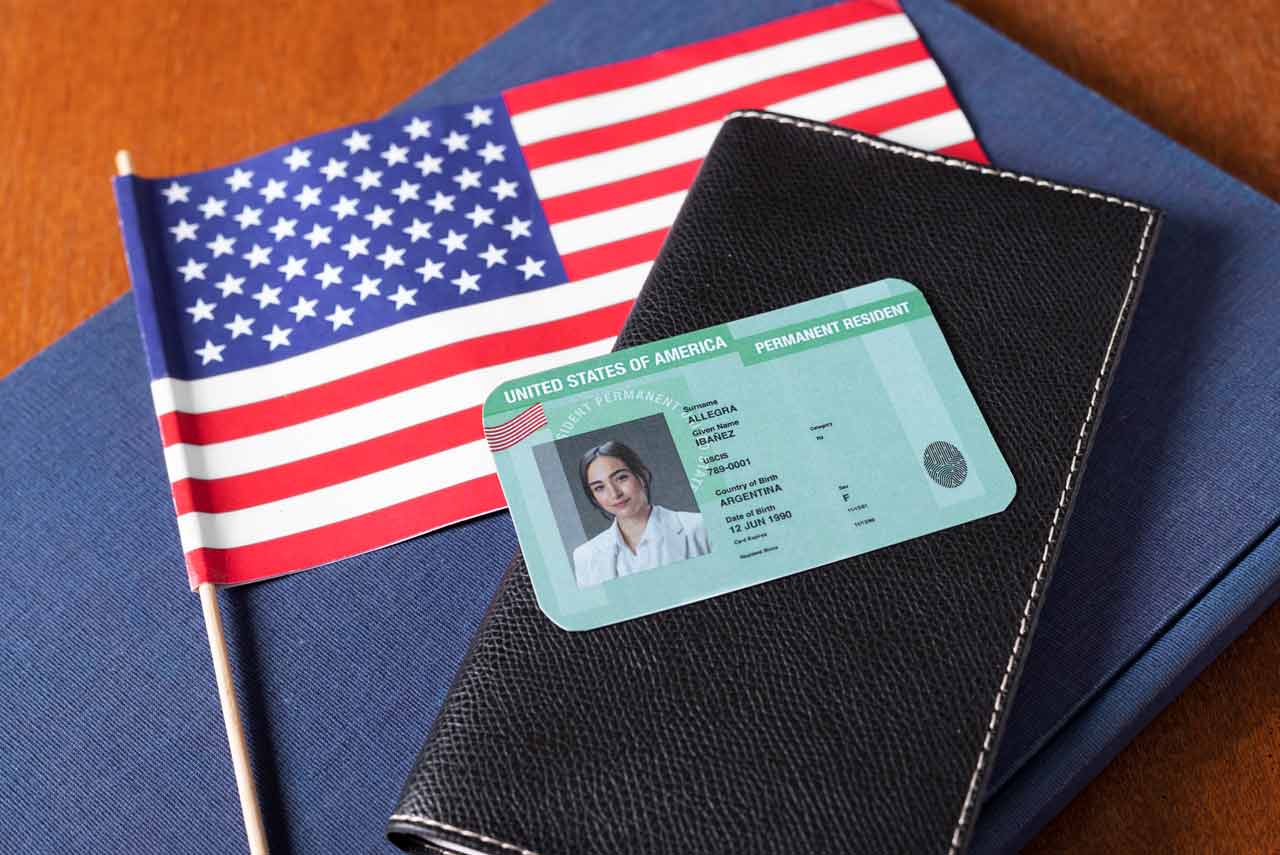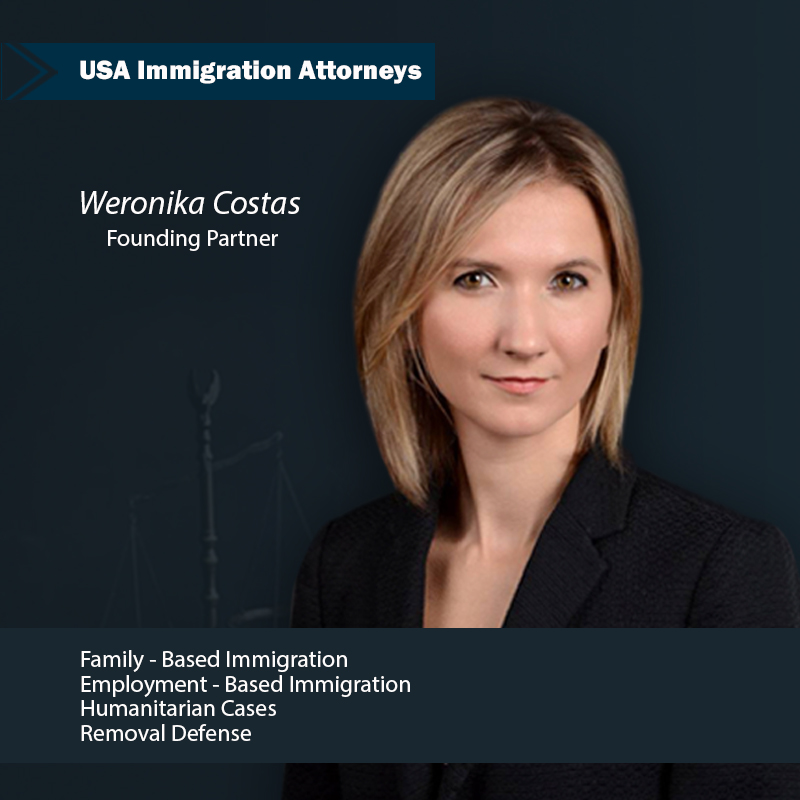Immigration law can be complex, especially for a foreign national aiming to be a U.S. citizen or permanent resident. As the leading independent provider of citizenship and immigration services in our service areas, every immigration attorney from The Costas Network Law Center, LLC answers hundreds of questions from spouses, partners, and family members about green card sponsorship and labor certification.
In this explainer, a licensed immigration lawyer from The Costas Network Law Center, LLC, will outline everything you need to know about the green card application process, from income requirements to which supporting documentation is necessary.
By knowing the sponsorship types, how premium processing works, and how the United States prevents human trafficking through legal immigrant visas, you can be better prepared to apply for a green card.
What Is a Green Card?
A green card grants lawful permanent resident status to foreign nationals. Permanent residents can live, work, study, and own property in the United States without special visas or requests. Many applicants hire a licensed immigration attorney to help them navigate the complex pathway toward becoming U.S. citizens.
Becoming a green card holder gives you certain rights, but it also entails new responsibilities. For example, a male green card holder between 18 and 25 must apply to the Selective Service System, which could subject them to military conscription. The U.S. government could also revoke your green card privileges anytime for violating immigration laws.
Most applicants apply for these five kinds of green cards:
Family-based green card
Employment-based green card
Humanitarian green card
Diversity lottery green card
Longtime-resident green card
A green card application is also called an Adjustment of Status. Individuals can stay in the United States on Adjust Status while the government processes their green cards. Consular processing refers to people who self-petition for green cards outside the United States. The green card filing fee is $1,760 for people on Adjust Status and $1,200 for applicants outside the United States.
For more information about the different types of permanent residence, call The Costas Network Law Center, and we will be happy to provide you with a free consultation.
What Are Green Card Sponsors?
As a green card applicant, you must prove to the United States Citizenship and Immigration Services agency (USCIS) that you can live independently or support yourself financially without relying on government aid reserved for legal citizens.
People applying for a marriage green card must file an Affidavit of Support or Form I-864, which outlines that they accept the financial responsibility for caring for their partner.
The USCIS reserves the right to deny a green card petition if a permanent resident fails to meet their financial threshold. In the case of Form I-864, the spouse, who is a lawful permanent resident, becomes the green card sponsor.
Different kinds of green cards carry various financial requirements, often necessitating help from an immigration lawyer to help iron out the details.
Green Card Sponsor Income Requirements
A U.S. citizen must make at least 125% of the annual income indicated in the Federal Poverty Guidelines for their specific location. For example, childless couples in the 48 states of the American mainland must have a combined yearly income of at least $22,887 before they can sponsor someone.
Citizens can use assets, like investments and property, to make up the difference. Income requirements vary depending on the prevailing wage and costs of living in your locale. You must also indicate the number of people in your home, including your spouse, minor children, and yourself, which will increase your annual income requirements as a co-sponsor.
To meet Federal Poverty Guidelines, an additional household member will add $6,425 in the U.S. mainland, $8,038 for sponsors in Alaska, and $7,387 for sponsors in Hawaii. A co-sponsor must not be in active military service and outline only one relative in an affidavit of support.
Green Card Sponsorship Categories: Who Can Sponsor Whom
While any American citizen can financially support a student from overseas, new entrants into the labor market, or religious workers like missionaries and pastors, the USCIS places a premium on sponsorship from a family member.
The following categories serve as guidelines on whose immigrant petition you can sponsor. USCIS also delineates the standards you must meet, like living above the poverty line and fulfilling other income requirements.
Sponsorship from a Family Member
If you are a lawful resident aged 21 or older, you can be the primary sponsor for an immediate relative, such as your parents, stepparents, children, stepchildren, and in-laws. Your sponsorship category is “Immediate Relative,” indicating you are a family member applying for a green card for a loved one.
Widows and widowers can also apply for a family-based green card by filing Form I-130. Until 2009, widows and widowers had to be married for at least two years to their deceased spouse, who was a U.S. citizen, to apply for a green card. Today, they only need to provide evidence their marriage was authentic.
A widow or widower might have a claim to the estate of their deceased spouse, which could prove their capability to support themselves theoretically. However, they would need to rely on the discretion of the USCIS, with help from a licensed immigration lawyer to represent their interests.
A permanent resident over 21 can file Form I-130, a Petition for Alien Relative, for an immediate family member. They can sponsor their brothers, sisters, spouse, and married and non-married children.
Preference Categories
The USCIS sees marriage-based green card applications as a direct route to citizenship. Family-based ones have a tiered system called “Preference Immigrants”:
• F1 or First Preference applications are for unmarried children 21 or older of U.S. citizens. It has an average wait time of six years for most countries, nine years for the Philippines, and 23 years for Mexico.
• F2A, or Second Preference A, is a category for spouses and non-married children under 21, currently granted expediently.
• F2B, or Second Preference B, is for non-married children over 21 of permanent residents or green card holders. These wait times are similar to F1 applicants.
• F3, or Third Preference, is a sponsorship class for married children of U.S. citizens. The wait times for these applications are kilometric, often exceeding 13 years for citizens of most countries, 19 years for Filipinos, and 24 years for Mexicans.
• F4, or fourth preference, is for sisters and brothers of U.S. citizens. Sponsorship and green card processing typically last 14 years. Applicants from India usually wait more than 15 years, from the Philippines 19 years, and from Mexico 22 years.
Employer Sponsorship
An employment-based green card allows foreign workers with extraordinary abilities or excellent research credentials a leg up in the green card process. The United States expects quality economic, cultural, and scientific contributions from these qualified workers.
Labor certification requirements state that there must be an absence of any minimally qualified U.S. worker for a specific position. A sponsoring employer must also guarantee the following:
• Full-time employment
• A permanent job, disqualifying seasonal positions from sponsorship
• Reasonable job requirements
• Pay that matches the prevailing wage of every other qualified U.S. worker in the same position
Preference Categories
The Bureau of Consular affairs divides employment-based green card applications into different categories:
• E-1 or First Preference is for Priority Workers, which include multinational executives, outstanding researchers, and professionals with extraordinary ability, like athletes and published authors in their home country.
• E-2 or Second Preference is for professionals with advanced degrees, such as a Ph.D., doctors, or an advanced degree in the arts that demand significant contributions and exceptional ability, like conducting operas or performing research work. A bachelor’s degree or a foreign equivalent will not substantiate an E-2 application. Immigrating physicians planning to work in an underserved location can apply for a National Interest Waiver and earn E-2 privileges.
• E-3, or Third Preference, is for a skilled worker with a job that requires at least two years of training, usually with a diploma from an internationally recognized university. An unskilled worker could also apply for a green card under E-3, granted their jobs are not seasonal. Delivery driving, hotel housekeeping, and service reps are examples of unskilled labor.
• E-4, or Fourth Preference, is for Special Immigrants like religious ministers, employees of U.S. agencies and initiatives abroad, and NATO-6 civilians and their immediate families.
• E-5, or Fifth Preference, is for Immigrant Investors providing capital to pursue commercial opportunities in the United States.
The average processing time for all of these categories is six months. It might take longer as the USCIS works on a case-to-case basis.
Do I Need a Green Card Joint Sponsor?
A joint sponsor is a lawful permanent resident who agrees to take on the financial obligation of supporting an applicant. When a sponsoring spouse or relative does not meet the income requirement from the USCIS, an individual may push through with their green card application with a joint sponsor.
Contact the Immigration Lawyers at The Costas Law Network, LLC
Learn more about the entire process of green card sponsorship, from filing your application to your in-person interview, by calling the Costas Law Network, LLC at (346) 818-2726 and requesting a free consultation.



